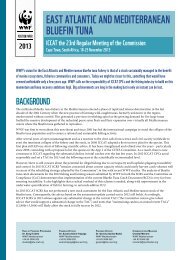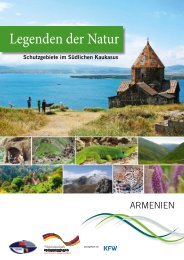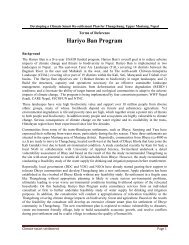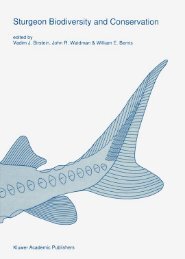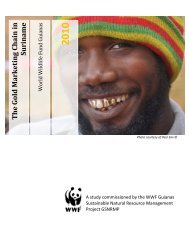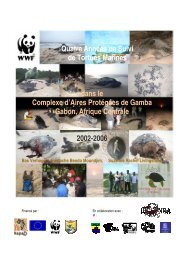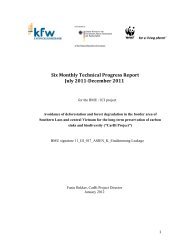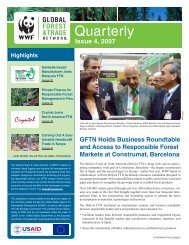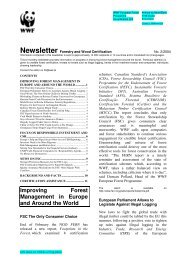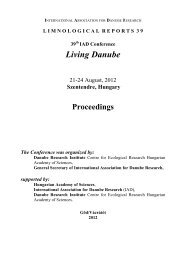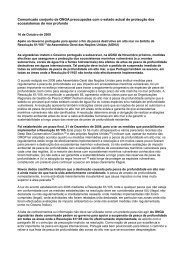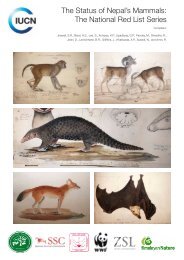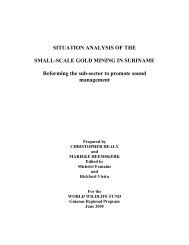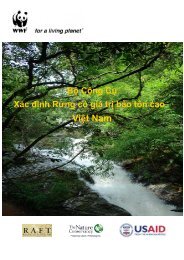The South Africa – Viet Nam Rhino Horn Trade Nexus (PDF ... - WWF
The South Africa – Viet Nam Rhino Horn Trade Nexus (PDF ... - WWF
The South Africa – Viet Nam Rhino Horn Trade Nexus (PDF ... - WWF
You also want an ePaper? Increase the reach of your titles
YUMPU automatically turns print PDFs into web optimized ePapers that Google loves.
SiTuATion AT THE SouRCE: SouTH AfRiCA<br />
Regrettably, the scale of “pseudo-hunting” problems grew significantly from 2005 through 2007 as<br />
more private sector operators seemingly embraced the <strong>Viet</strong>namese market. Only following intensified<br />
enforcement action in a number of provinces, recommendations from TRAFFIC and others for stricter<br />
measures, including closer scrutiny and monitoring of trophy hunting and professional hunters<br />
(Milledge, 2007a,b), and growing oversight pressure within the CITES arena did government authorities<br />
in <strong>South</strong> <strong>Africa</strong> move to strengthen regulatory controls. Recognizing the threat posed to the sport hunting<br />
industry by <strong>Viet</strong>namese who were neither experienced hunters nor interested in proper trophy<br />
preparation prior to export ultimately led to a series of legal requirements being imposed upon the<br />
hunting industry.<br />
One of the underlying problematic issues associated with many of these hunts was the fact that, prior<br />
to the introduction of the TOPS regulations, White <strong>Rhino</strong> could be hunted with “standing permits” on<br />
certain properties in Limpopo province, for instance, unbeknown to local conservation authorities.<br />
Without knowing whether a bona fide hunt had actually taken place or not, it was possible for provincial<br />
authorities vetting CITES export permit applications to issue documentation to allow both legal<br />
and illegal rhino horns to move out of the country unimpeded. While there has been a progressive<br />
tightening up of sport hunting regulations in <strong>South</strong> <strong>Africa</strong> since 2007, this major loophole was only<br />
abolished in August 2008 (Milliken et al., 2009b). In July 2009, new standards limited individual hunters<br />
to one White <strong>Rhino</strong> hunt per year and required national approval before provincial hunting licences<br />
can be issued (Milliken et al., 2009b). <strong>The</strong>se steps were all designed to close avenues of abuse and<br />
reduce the sport hunting of rhinos to previous levels, but are believed by some to have contributed to<br />
an increase in poaching on both State and private land.<br />
<strong>The</strong> entry of <strong>Viet</strong>namese hunters into the market since 2003 produced a profound effect upon the <strong>South</strong><br />
<strong>Africa</strong>n hunting industry. <strong>The</strong>se hunters have mostly been <strong>Viet</strong>namese but, since 2007, hunters from<br />
China have also acquired and exported 20 rhino trophies, only three of which have been subsequently<br />
reported as imports in the corresponding Chinese CITES import data. Further, although not apparent in<br />
the CITES trade data for <strong>South</strong> <strong>Africa</strong>, provincial hunting records indicate that at least one Cambodian<br />
national also conducted rhino hunts in <strong>South</strong> <strong>Africa</strong> in recent years, but did not ever subsequently obtain<br />
CITES permits for the legal export of the trophies to Cambodia. This general pattern of not surrendering<br />
CITES documents for rhino horn trophies at the time of importation, or conducting rhino hunts but not<br />
acquiring CITES export permits, reflects the same modus operandi evident in examination of <strong>Viet</strong> <strong>Nam</strong>’s<br />
CITES import data previously discussed. <strong>The</strong> fact that other Asian nationals are now seemingly engaged<br />
in similar conduct raises concerns that these trophies are also in reality destined for commercial trade<br />
purposes. Ultimately, it is not known whether the rhino hunts conducted by the Chinese and<br />
Cambodian nationals were independently motivated, or whether they were linked to the broader<br />
<strong>Viet</strong>namese rhino horn trade operation in <strong>South</strong> <strong>Africa</strong>. At the very least, these cases are perhaps indicative<br />
of an expanding problem.<br />
Only when the amended Norms and Standards came into effect in April 2012 were hunters from Asia<br />
effectively blocked from attempting to access rhino horn via “pseudo-hunting” of White <strong>Rhino</strong>s in <strong>South</strong><br />
<strong>Africa</strong>. In practice, this was achieved through interventions by DEA at a national level. On 7 March 2012,<br />
an urgent application to the Courts was launched against the Limpopo MEC: Economic Development,<br />
Environment and Tourism and the Minister of Water and Environmental Affairs by Jan Walters Slippers, a<br />
private hunting operator. <strong>The</strong> appeal was launched in response to the DEA advising provincial authorities<br />
not to issue hunting permits to <strong>Viet</strong>namese citizens due to various concerns regarding illegal hunting<br />
practices. In this case, Slippers had applied for hunting permits for five <strong>Viet</strong>namese citizens and, although<br />
they were initially authorized at the provincial level, the DEA moved to overturn this decision. At the<br />
hearing, the Court ordered the MEC to issue the permits, subject to the condition that the <strong>Viet</strong>namese<br />
hunters submit themselves for interviews with relevant government officials for the purposes of verifying<br />
their personal details, backgrounds, financial capabilities and other related information as per the amended<br />
Norms and Standards for sport hunting of White <strong>Rhino</strong>s. Necessary arrangements were then made for<br />
the hunters to attend the court hearings, but on the day of the interviews, the hunters were not yet in the<br />
country. It was later ascertained by the government that there were legitimate grounds for denying the<br />
permits. Based upon these concerns, the Court ordered that the permits not be issued and that the costs<br />
of the deliberations be charged to the applicant.<br />
56 ThE SouTh AFRICA <strong>–</strong> VIET NAM RhINo hoRN TRADE NExuS<br />
White or “square-lipped” <strong>Rhino</strong>s.<br />
Karl ammann



